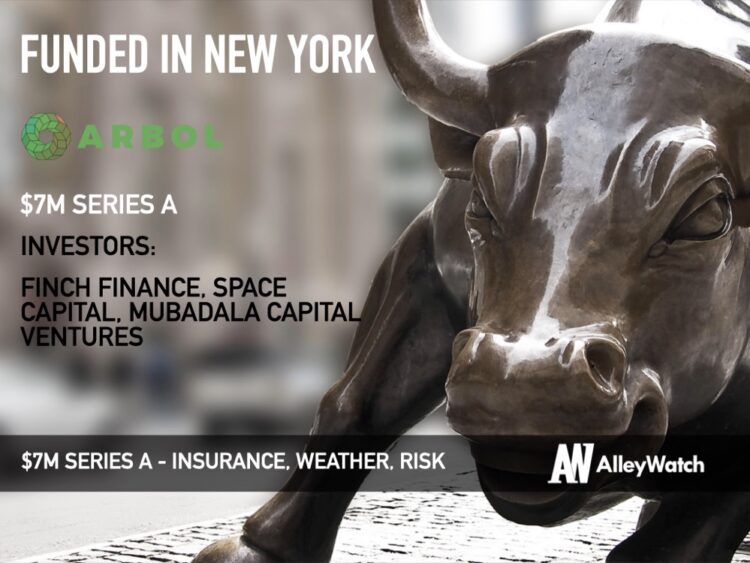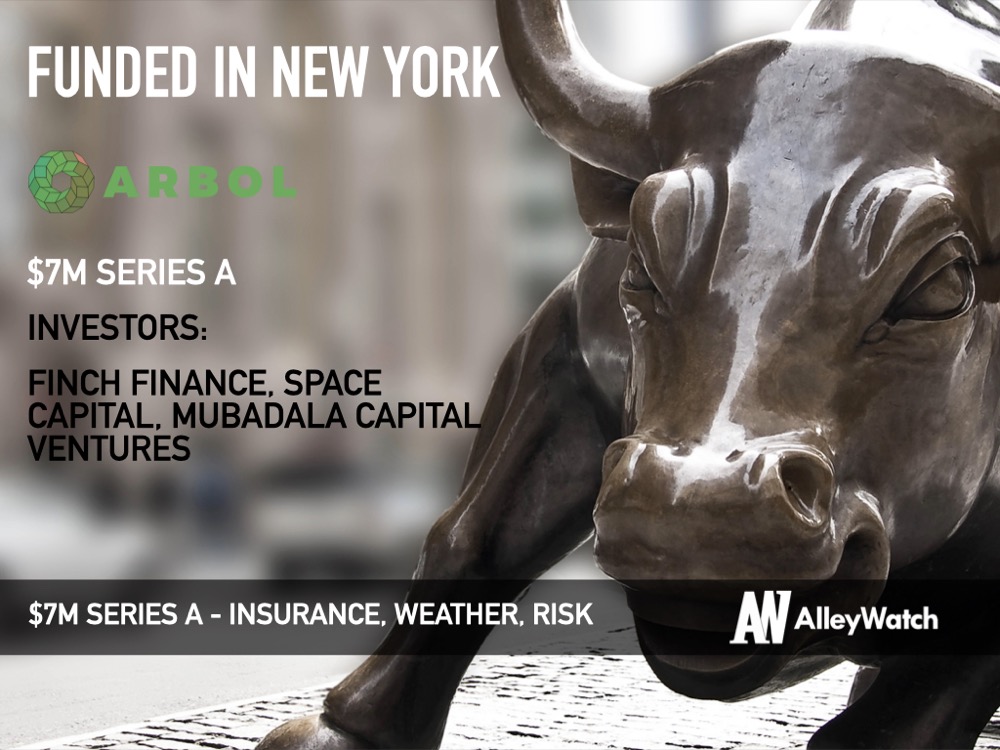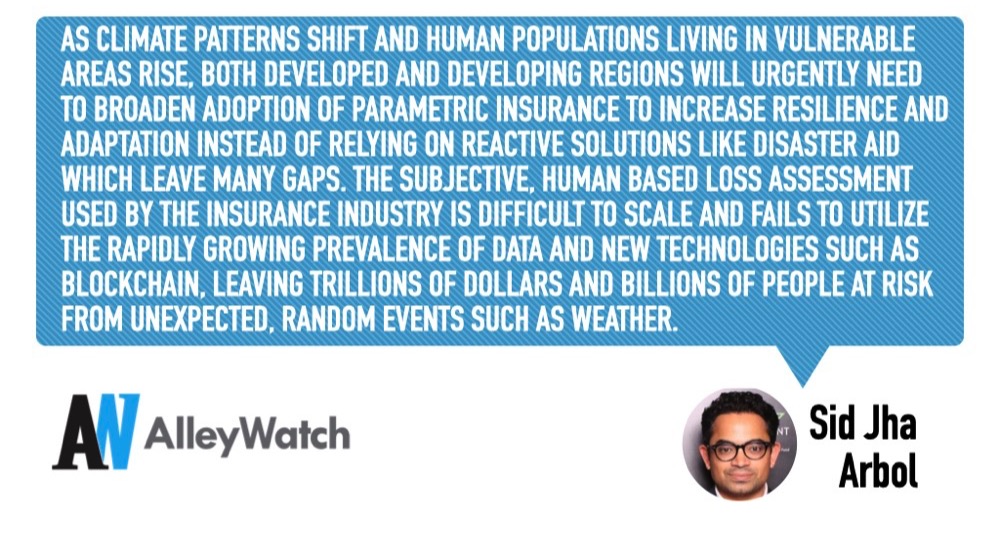The organizers of Wimbledon had the foresight to purchase pandemic insurance after SARS in 2003, paying $31M in premiums. This year they were covered for $142M in losses. The pandemic has made business owners more cognizant of different types of insurance products available to protect them against often insurmountable losses as a result of unexpected disruptions. Arbol has introduced weather risk insurance, a parametric coverage product, built on the blockchain to provide rapid payments in the event of loss without drawn-out claims processes. The company’s products are currently being deployed in the maritime, energy, hospitality, and agriculture industries, where weather risk can be severe. Since launching in March, Arbol has covered $15M in notional risk across the hundreds of deals already consummated.
AlleyWatch caught up with Founder and CEO Sid Jha to learn more about the benefits of insuring weather risk, the company’s experience launching right as the pandemic swept in, and the company’s recent funding round, which brings the total funding raised to $9M since the company’s founding in 2018.
Who were your investors and how much did you raise?
We recently closed our Series A round around Christmas and raised $7 million. All of the original investors from our seed round, including Finch Finance and Space Capital recommitted for our Series A raise, in addition to one new investor, Mubadala Capital Ventures. We also announced late last year that we had secured in excess of $250 million of our own non-traditional risk capacity. We expect to have in excess of $1 billion of dedicated risk capacity early this year, which will give us the flexibility to structure innovative parametric coverage products for new industries and regions.
Tell us about the product or service that Arbol offers.
Arbol is an insurtech platform focused on parametric coverage products that pay users quickly and fairly using objective data to cover external risks such as unexpected weather. Our goal is to create a simple experience for the client that gets them paid when data hits certain preset triggers without filing any claims paperwork, which eliminates delays and disputes that plague the traditional insurance process. Our products create transparent policies that pay when businesses suffer unexpected weather strikes enabling them to focus on their core business while having peace of mind about their coverage. For example, a farmer can get coverage if rainfall in the local area is too low or a wind farm can cover revenue shortfalls if wind speeds are unexpectedly low, with payments being decided using high-resolution datasets and without the need to deal with onerous claims paperwork. Arbol currently has parametric products for businesses in the agriculture, maritime, energy, and hospitality sectors.
What inspired the start of Arbol?
I founded Arbol, along with my three cofounders because I believe insurance is one of the key components of financial infrastructure that societies need to progress, and traditional insurance is lagging behind in the adoption of ideas and technology to face the challenges of the coming decades. Arbol’s mission is to overhaul the insurance industry and change the way we scale insurance around the globe. Widening adoption of insurance is necessary for everyone to ensure external risks out of their control do not set them back financially and enable more investment in the future. As climate patterns shift and human populations living in vulnerable areas rise, both developed and developing regions will urgently need to broaden adoption of parametric insurance to increase resilience and adaptation instead of relying on reactive solutions like disaster aid which leave many gaps. The subjective, human-based loss assessment used by the insurance industry is difficult to scale and fails to utilize the rapidly growing prevalence of data and new technologies such as blockchain, leaving trillions of dollars and billions of people at risk from unexpected, random events such as weather.
How is Arbol different?
What sets Arbol apart is that our coverage is parametric. What that means is that instead of using human adjusters to assess loss and determine payouts in our contracts, we use predetermined, verifiable, and secure datasets to determine when you will get paid. Once the triggers for loss as determined by the applicable datasets in a contract are met, a payout is automatically executed by Arbol’s smart contracts, and the client gets paid much faster than the dreaded claims process and the huge burden of paperwork insurers put on customers.
Arbol’s products seek to bring transparency and objectivity to the weather risk market and eliminate many of the burdens of traditional insurance policies that clients typically deal with. With a traditional insurance policy, a client enters into contracts that are hundreds of pages long and has no idea what they will get paid until the long and onerous claims process is completed, making it very difficult to plan for the future. Just in this past year, many providers have invoked exception clauses to avoid much-needed payouts for COVID-19 related business interruption, leaving businesses across the country hung out to dry, with some even having to declare bankruptcy due to denied claims.
What market does Arbol target and how big is it?
We currently serve businesses in the agriculture, maritime, energy, and hospitality industries, and are working to expand our menu of customizable product offerings every day to serve the unique needs of businesses in these sectors. Our addressable market is massive as economic losses from natural causes are rising to hundreds of billions of dollars annually with a large percentage uncovered. The market is different in each of these sectors with Arbol creating new markets in different niches as businesses begin to realize the need to manage exposure to shifting weather patterns. In agriculture alone, it is estimated that $1 trillion of crops are uninsured annually and millions of agribusinesses on top of this are underinsured. Some of our products, like our unique solution for Hemp growers, is the only multi-peril weather product of its kind currently available on the market. In other industries such as hospitality, Arbol aims to upgrade travel insurance in a major way by covering adverse weather affecting your vacation.
What’s your business model?
Arbol’s business model is to take a transaction fee for each deal arranged on the platform. Our fees are much lower than the typical transaction costs charged by many layers of intermediaries in the market currently. We have dedicated risk capacity from non-traditional sources backing us, which affords us the ability to be more aggressive on the base pricing as well in many cases.
How has COVID-19 impacted your business?
The Arbol platform launched for live transactions in March of last year, just as the COVID-19 pandemic was beginning to sweep across the U.S. Despite the disruption of the pandemic, our platform gained rapid traction in its first eight months. We signed on hundreds of institutional clients ranging from small farms to large corporations and transacted $15 million of notional risk across the platform.
COVID-19 has exposed many flaws in the traditional insurance industry this past year. Family-owned restaurants and large companies like Century 21 and Major League Baseball have all gone to court with their insurers over withheld business interruption payouts. The subjective nature of many of these policies has left businesses scrambling to figure out how to make up for massive losses over the past year. We believe that parametric insurance, and platforms like ours that offer parametric products, will see broader adoption in the post-COVID landscape because businesses will no longer want to have to worry about whether their insurer will come through for them in a time of crisis. They will want and demand transparency.
What was the funding process like?
The funding process, as with most companies, took time, hundreds of conversations, and a huge amount of materials developed to help communicate our vision. Finding the right investor takes time since the fit has to work for both parties. For Arbol, we needed to find investors who were comfortable with the complex industry we operate in and also whose risk preferences aligned with our size and growth at the time.
What are the biggest challenges that you faced while raising capital?
Explaining the big picture behind Arbol was the greatest challenge. Arbol at its core concept is relatively simple – get the customer paid when something like bad weather strikes. The execution of this concept, on the other hand, is extremely complex with customer education, complex datasets of differing pros/cons, evolving standards in the blockchain world, regulations, legal complexity, and a host of other challenges we have to deal with every day. For a prospective investor, it is a challenge to understand the bigger vision that allows all of these components to come together and create a thriving ecosystem for the business, especially compared to simpler B2C business models that they may be looking at.
What factors about your business led your investors to write the check?
I think our investors saw the problems in the insurance sector along with the need for a new approach to challenges such as climate risk, much like we did when founding Arbol. Our investors are some of the most sophisticated entities in the financial sphere and we are fortunate to have their backing.
What are the milestones you plan to achieve in the next six months?
We have a large slate of products that are coming out for agriculture, energy, hospitality, and other industries. We have finalized a number of key partnerships in the last few months and set up entities to transact different types of business which will allow us to rapidly broaden our footprint.
What advice can you offer companies in New York that do not have a fresh injection of capital in the bank?
Keep in mind that funding is just one of many goals a business needs to concurrently achieve. It is essential to keep building the foundations of future revenue via the right partnerships and products and keep refining the business plan, which also helps with fundraising.
Keep in mind that funding is just one of many goals a business needs to concurrently achieve. It is essential to keep building the foundations of future revenue via the right partnerships and products and keep refining the business plan, which also helps with fundraising.
Where do you see the company going now over the near term?
We aim to become the go-to company for any business looking to manage their revenues or supply chains from weather risk. The near-term focus will be further product development and marketing our capabilities to prospective customers.
What’s your favorite outdoor dining restaurant in NYC
Rubirosa was always one of my favorites. I have a baby now so less eating out!




